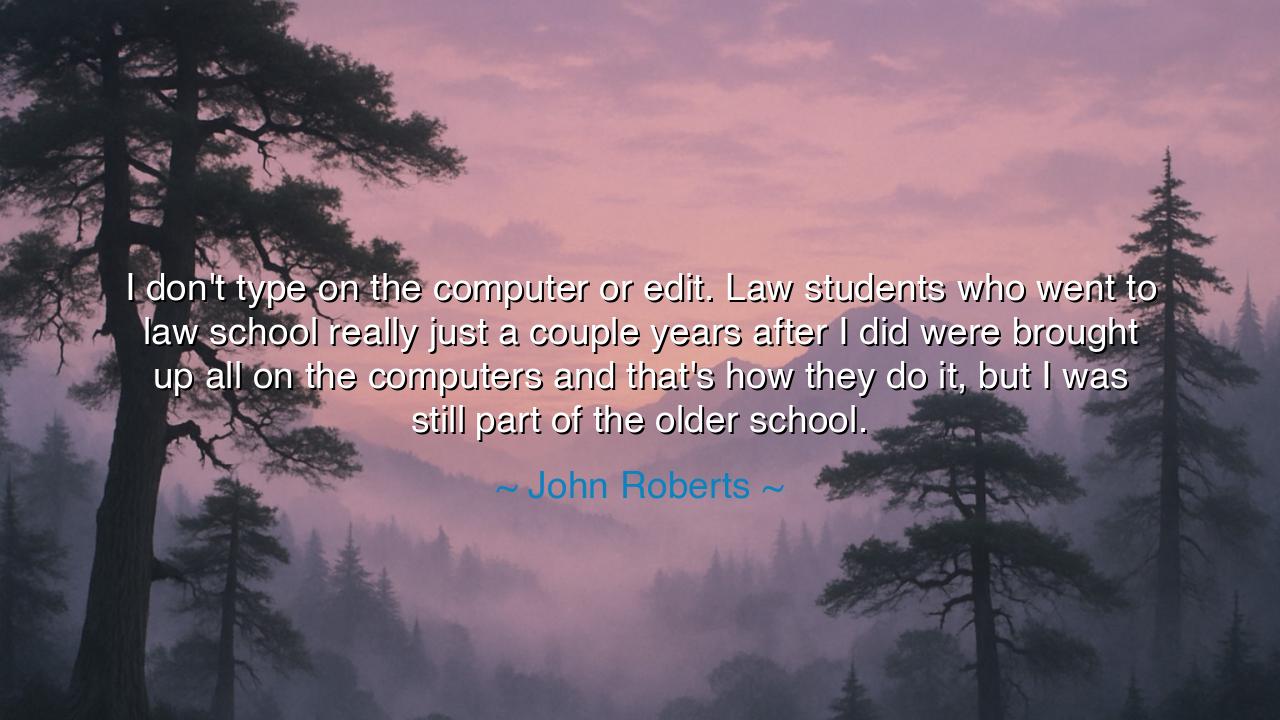
I don't type on the computer or edit. Law students who went to
I don't type on the computer or edit. Law students who went to law school really just a couple years after I did were brought up all on the computers and that's how they do it, but I was still part of the older school.






“I don’t type on the computer or edit. Law students who went to law school really just a couple years after I did were brought up all on the computers and that’s how they do it, but I was still part of the older school.” Thus spoke John Roberts, Chief Justice of the United States — a man whose life straddles two worlds: one rooted in the discipline of paper, ink, and reflection, and the other racing forward in the dazzling glow of digital speed. His words, spoken humbly, carry far more than nostalgia; they are a meditation on tradition and change, on the tension between the old ways that shaped wisdom and the new tools that shape efficiency. Through this statement, Roberts reminds us that in every generation, technology advances — but the heart of understanding remains the same.
In the ancient days, wisdom was passed not by the pressing of keys, but by the pressing of thought upon memory. The scribes of Mesopotamia, the monks of Europe, the scholars of Greece — all bent their backs over parchment and tablet, learning patience through the very act of writing. Every word written by hand was an act of intention, every correction a deliberate labor of the mind. To belong to the “older school,” as Roberts calls it, is to belong to this lineage — to an age when thought was slower, but deeper; when time itself seemed to conspire with the thinker, not against him.
Roberts, though he sits in the modern era, speaks from the threshold between eras. He entered the world of law when reasoning was still trained by books, not screens; when editing a sentence required not the swift strike of a delete key, but the patience to rewrite and reexamine. His admission — that younger lawyers had already begun to live by the rhythm of computers — is not a complaint but an observation of continuity through difference. He acknowledges that technology has transformed how we work, yet he hints that discipline, reflection, and understanding cannot be automated. They belong to the human mind, and the mind learns best when challenged by slowness.
Consider the story of Marcus Aurelius, the philosopher-emperor of Rome. In the midst of ruling an empire, he carried no assistants of technology, no scribes to polish his words. Alone in his tent, by candlelight, he wrote his Meditations by hand — thoughts meant not for the world, but for himself. Every line was an act of discipline, every reflection an act of care. His writing was slow, but his wisdom eternal. If he had lived in our time, he might have typed faster, but he would not have understood more. For understanding, as Roberts reminds us by example, is born not from speed, but from presence — from the soul’s dialogue with its own thought.
The computer, though wondrous, invites the illusion that faster is better. It rewards instant correction, endless revision, and boundless production — yet it risks draining from us the humility of limitation. Roberts, by keeping faith with the “older school,” resists this tide. His refusal to type is not stubbornness, but reverence for the contemplative process — for the human mind’s need to wrestle with ideas slowly, to taste its own thoughts before speaking them. In the law, as in life, haste is the enemy of judgment. Wisdom, he teaches us, is born in the pause between words.
Yet his words are not a rejection of progress. Roberts does not condemn the new school — he merely reminds it of its roots. For technology, without memory of tradition, becomes shallow; but tradition, without adaptation, becomes stagnant. The true path lies between — in honoring what was while embracing what can be. The older school and the digital age are not enemies but partners, each holding what the other lacks: the one, patience; the other, possibility.
So, O seeker of wisdom in this restless age, take heed of John Roberts’ reflection. Do not let the tool replace the thought. Use technology, but do not let it use you. When you write, think not only of what you say, but of why you say it. When you work, remember that speed does not equal depth, and ease does not equal mastery. Take time — for time, once lost to haste, can never be regained.
Thus, let this truth be passed down: the wisdom of the old and the innovation of the new must walk hand in hand. For progress without reflection is chaos, and reflection without progress is decay. Whether by pen or by pixel, let your craft be guided by the ancient virtues — patience, clarity, and care. Then, even in the most modern age, you will remain a student of the eternal school — the school of the thoughtful mind.






AAdministratorAdministrator
Welcome, honored guests. Please leave a comment, we will respond soon